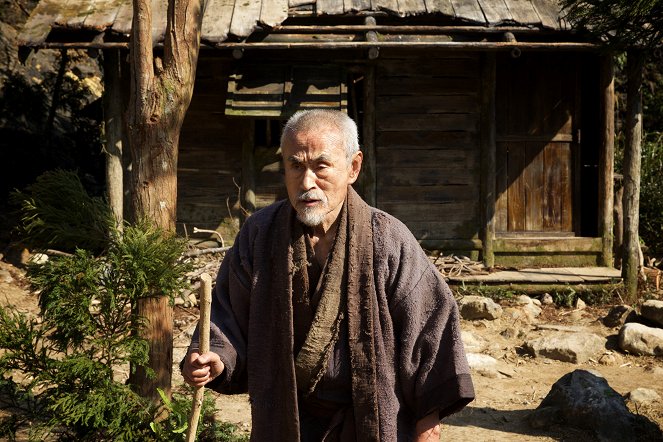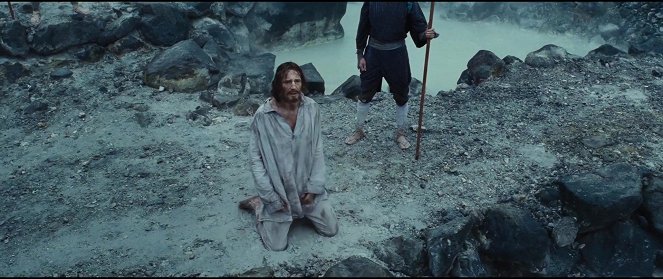Directed by:
Martin ScorseseCinematography:
Rodrigo PrietoCast:
Andrew Garfield, Adam Driver, Liam Neeson, 浅野忠信, Ciarán Hinds, Shin'ya Tsukamoto, Yōsuke Kubozuka, Ogata Issei, Sabu, Ryō Kase, 小松菜奈, 美知枝, Katsuo Nakamura, 笈田ヨシ (more)VOD (1)
Plots(1)
The film follows 17th century Jesuit priests Sebastiao Rodrigues (Andrew Garfield) and Francisco Garrpe (Adam Driver) as they travel to Japan in search of their mentor Father Cristóvao Ferreira (Liam Neeson). With the Japanese government wishing to suppress any kind of western influence and Japanese Christians forced into the wilds of the countryside to practice their faith in secret, the pair face violence and persecution immediately after setting out on their quest. Witnessing the torture and punishment of the Japanese first hand, it's not long before the priests face a spiritual crisis as they begin to question all that they previously believed. (Transmission Films)
(more)Videos (19)
Reviews (14)
An artistic statement that is not as thought-provoking as The Last Temptation of Christ, yet it is a beautiful piece of filmmaking, thoughtful, with first-class visual compositions. My relationship with this film is ambivalent. The main characters – the Christian priests – didn’t have my sympathy because they were spreading the gospel in a culturally different country where no one asked them to (and where Buddhism was strongly rooted) and at the cost of immeasurable suffering for the common folk, bleeding and dying, but at the same time, this account of Scorsese as a deeply religious man is so honest that you have to admire it, even if you might be ideologically inclined in a different direction. Scorsese wanted more, to show that the people of the distant past deeply believed in symbols and that strongly rooted beliefs cannot be broken, no matter how hard the hostile environment tries. Everyone believes in something. Some believe in the power of nature, some in the power of family, others in the power of money, and Scorsese and other Christians in the power of the Christian God. And I, an ordinary person and a mere atheist, have no right to deny and question this belief. Although I will still side with Father Ferreira (Liam Neeson) and prefer the aforementioned The Last Temptation of Christ, which was deeper. PS: Garfield was brilliant. I was already intrigued by him already in The Social Network and I knew we would hear a lot about this guy.
()
One star for perfect cinematography, the rest fell victim to utter boredom and annoying Catholic propaganda. The answer to most of the questions asked by Father Rodrigues could be: "Because you came here forcing your delusions on us!" Fortunately, the Japanese did not make the same mistake as the Aztecs and Incas. They allowed the Catholics to become martyrs, thus avoiding the Conquista and the Holy Inquisition. The film was awfully long, and the story was so monotonous it dragged on like a snail soaked in honey. I wished the main characters a slow and painful death, and I was secretly hoping that one of the Japanese would finally run out of patience, reach for a katana and create a ‘pagan's cut,’ cutting the film shorter by at least a third.
()
This film project, which director Martin Scorsese worked on for a considerable number of years, had long eluded me. I was somewhat deterred by its length and religious theme. But now I can say that avoiding the film was a mistake. Sure, this movie set in the attractive backdrop of Japan might not appeal to a broad audience, which I completely understand, but from a craftsmanship perspective, it’s flawless. The acting is absolutely transcendent; Andrew Garfield and Adam Driver both clearly demonstrate their professional preparation for their roles as Christian missionaries sent to the "Land of the Rising Sun." Their dramatic weight loss alone deserves a thumbs up from every viewer. The film doesn’t use any sets or substitutes for exteriors; you get to fully enjoy the beautiful and varied landscape of this exotic country. Besides the polished dialogues, the film gives a glimpse into how the Japanese dealt harshly with missionaries in the 17th century (there are some intense scenes of torture that take your breath away). The ending is excellent. I was just a fraction short of giving it five stars. Scorsese excelled (as expected! :D). For me, it’s 8.5/10.
()
I admire Martin Scorsese for reaching for matters of the heart without hesitation, even after audience-pleasing films like The Wolf of Wall Street or Shutter Island, knowing that it may not be successful commercially. And as is customary with matters of the heart, one reluctantly leaves out, limits, or shortens one's expectations. The fight for truth, against suffering, and with one's own ego, is portrayed in a way that is a destructive spectacle, thanks in large part to a phenomenal performance from Andrew Garfield. It raises a hundred and one questions, but mostly focuses on the same topic, which inevitably becomes tiresome even for the most accommodating viewer given the copious running time. Through Rodrigo Prieto's captivating camera work, Silence is visually stunning, but due to the sluggish screenplay, it is a bit challenging to engage in conversation about it.
()
The first half is hell. A non-stop conversation about belief in God, interspersed with Rodrigo Prieto's gorgeous cinematic orgy. Unfortunately, Silence, especially in its first half, is annoyingly tedious, relatively simple, and in no way thought-provoking. But that gradually changes, and the arrival of Liam Neeson on the scene makes a fitting twist. His polemical conversation with Andrew Garfield about faith is interesting, thought-provokingly robust and to the point, and it gives the film a welcome sense of purpose and dramatic arc. The running time of Silence is monstrous considering the intimate story it tells, but as a probe into feudal Japan involving the Christian faith, it's manageable. I wouldn't have guessed Scorsese made it at all. On the face of it, it has nothing to do with his classic masterpieces. But it does with the religious ones.
()
Gallery (59)
Photo © Paramount Pictures



Ads